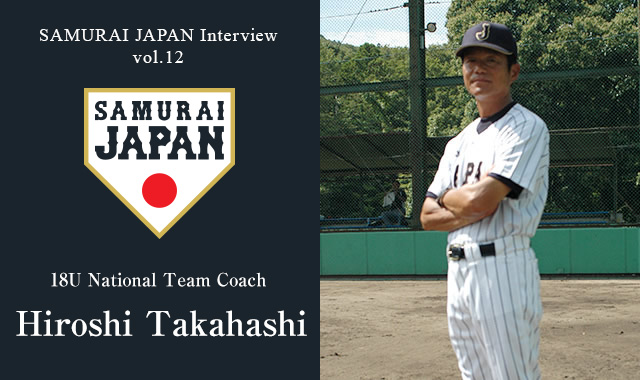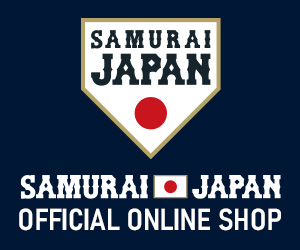SAMURAI JAPAN Interview
Samurai Japan Interviews Vol. 12: Interview with 18U National Team Coach Hiroshi Takahashi
8/28/2014![]()
Responsibility as National Team Coach
----How was your state of mind the first time you heard you were being made national team coach?
When I was first chosen to coach the Japanese national team in 2003, my school's name was still Naruto Industrial (now Naruto Uzushio), and our team had appeared in Koshien for three seasons from the spring of 2002. This time, we hadn't been there for a long time, so I wondered what was going on. It was a very generous offer and a serious matter, but I couldn't think of a reason to refuse, so I accepted.
──At the "Samurai Japan 18U National Team Press Conference" held at the Nakazawa-Saeki Memorial Baseball Museum on August 26th, you didn't seem to smile much.
That's because I felt the responsibility of bearing the Rising Sun.
──After the press conference, you strongly urged the players to "face this with passionate feelings, just like when you strived for the summer Koshien tournament in June" at the team formation ceremony, in front of all the players and officials.
Perhaps it's just the afterglow of Koshien, but I thought there may have been some people who thought of this as a reward. I used that expression with the intention to get them to switch gears.
Batting Line of Left-Batting Speedy Base Runners Formed Around Kazuma Okamoto
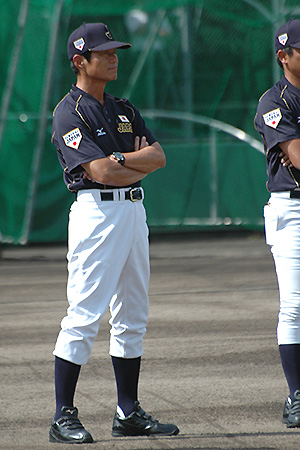
──How were the players selected?
We basically centered the selection around the Japan High School Baseball Federation's Skill and Promotion Committee. However, my opinions were included as well.
──What were those opinions?
I thought mainly about players who were fast runners, and these ended up being players like Naoto Wakimoto (Takasaki University of Health and Welfare Takasaki), Kentaro Tokumoto (Ryukoku University Heian), and Daiki Asama (Yokohama). For outfielders, this improves not only their base-running but also widens their fielding range. Also, Yukinori Kishida (Hotoku Academy) is a catcher, but can also play the infield. We chose pitchers who could play as fielders as well, such as Junichiro Kishi (Meitoku Gijuku), and that's how we got our current lineup.
──It seems like you have a lot of left-batters.
That's become somewhat controversial, but I determined that they could handle it regardless of whether they threw right or left. In fact, they all have incredible sense, including the right-batters. They were all able to cope with a wooden bat without a problem, right from day one.
──Does you feel like the batting order will be solidified as you play the games?
Kazuma Okamoto (Chiben Academy) is definitely going to bat fourth. Kishida can cover first base, so I'm thinking of having him be the designated hitter.
──It seems you can form a good lineup with Okamoto as the center.
I'm thinking a lot of different thoughts, like maybe having Takumi Minemoto (Osaka Toin) bat first, or maybe Naoto Wakimoto (Takasaki University of Health and Welfare Takasaki), since he has the legs and can hit homeruns. All that's left is to place them, considering whether they're right or left-hitters.
Mitsunari Takahashi as the Center of the Pitching Staff
──How about the pitching staff?
At this point, I'm thinking about centering it around Mitsunari Takahashi (Maebashi Ikuei), who won at Koshien in the summer of last year. However, it's been over a month since he's had a real game, so I want to assess him and the other pitchers after our domestic practice games with university students and the three preliminary games.
──There is also Kishi, who won at Koshien for four straight seasons.
Kishi actually pitched a perfect game when my school (Naruto Uzushio) played a practice game with Meitoku Gijuku at the end of April. He never pitched above the knee, and the ball never flew to the outfield.
──That's amazing. Was there a reason for that?
Coach Shiro Mabuchi (Meitoku Gijuku) would later tell me that before the game, he told him, "Coach Takahashi is going to coach the Japanese national team. If you want him to pick you, you have to pitch your best." I think he can pitch in any setting. He can also throw breaking balls that curve slightly, and I think that will work well against foreign batters. The batting lines of Korea and Taiwan are going to tremble.
──Why did you choose the catcher Ryoya Kurihara (Harue Technical) as captain?
We took a vote, but I made the final decision, only using that as a reference. My ideal was to have a catcher that would play in every game.
The Key to Victory is the Tournament Semifinals
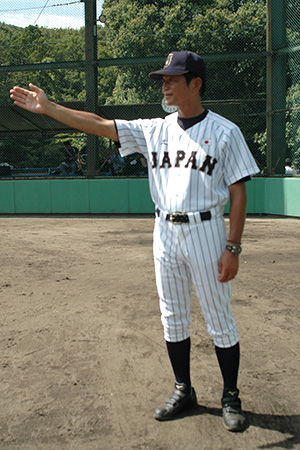
──Do you already have an image of the competition?
Japan is in "group 1" of the preliminary league, and their opponents are the Philippines, Sri Lanka, and China. The key to victory will be in the tournament that the top two teams of each preliminary group will advance on to. Particularly the semifinals.
──"Group 2" consists of South Korea, Taiwan, Thailand, and Pakistan. There is a high probability that they will face South Korea and Taiwan in the tournament, since they are in a different group. Have you thought of a countermeasure against them?
Both of them are playing in the first round of the preliminary league, so we're all going to watch them. However, they're going to do some maneuvering as well. They may not reveal their hand until the tournament, so I think we will have to adapt to them on the spot.
──What are you thinking for your team's game plan?
We're going to base it on small baseball, centered on fielding. That's why it's a matter of how much the pitcher can throw. I think our fielding isn't bad.
──You have a lot of good batters among your members. Does this mean that you can stay true to the general high school baseball style of Japan?
Yes. If it's a close game, we may do more bunts.
──In case of extra innings, they're introducing a tie-breaker where they begin with no outs and base 1 and 2 loaded. Do you have any thoughts on this?
When it comes to squeeze plays and such, the details will all depend on the opposing pitcher. That's why we have to focus on defense rather than offense. We've practiced the tiebreaker in our domestic training camps.
Samurai Japan's Manners Becoming an Example for the World
──What do you think of Japan's baseball teams connecting everything from the 12U to the top team under the name "Samurai Japan"?
I'm greatly humbled. I consider it a blessing to play under that name.
──There is a possibility that these players will carry Japan in the future as national team players in the university and amateur divisions, and even in the World Baseball Classic.
I hope that there will be many players from this team that will go on to that. Also, I believe I have chosen players with that potential. But that said, right now they are a high school team, which is different from professional baseball. Their manners as high school students factor in to the selection, and that's what I seek throughout the competition.
──I think that Japan will be the biggest goal of every country this tournament. What do you think about that?
Rather than the biggest, I think it's a three-way tie with Korea and Taiwan, but Japanese high school baseball is done with educational considerations. In that sense, it is my ideal to be a model for foreign nation. It is a contest, and it's all over if we lose, and I can't just gloss that over, but I want to stress this as Japan's national team.
──To be a model in all areas, including not just your plays but your manners?
To be the best. I entered the Fifth AAA Asian Baseball Championships as a coach in 2003, and when I got to the bench, it was littered with the previous team's garbage.
──Is that right?
We don't do this at Koshien because we have no time, but in Japanese prefectural competitions we clean up before we go home. I want us to take leadership in that area as well.
──Finally, how would you sum up the kind of baseball "Takahashi Japan" is striving for in one word?
Basically, to bring it to a close game and pull ahead. Our attitude will be "Bunt, squeeze, do whatever it takes to win!", and we will play on with the weight of Japan on our shoulders.
Latest Article
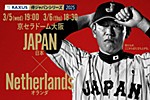 |
RAXUS SAMURAI JAPAN SERIES 2025 JAPAN vs NETHERLANDS roster announcement 02/14/2025 |
|---|
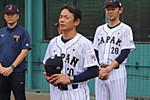 |
11th BFA U12 Baseball Championship roster announcement 10/10/2024 |
|---|
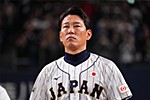 |
RAXUS SAMURAI JAPAN SERIES 2024 JAPAN vs CZECH REPUBLIC roster announcement 10/9/2024 |
|---|
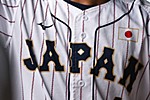 |
13th BFA U18 Baseball Championship roster announcement 8/23/2024 |
|---|
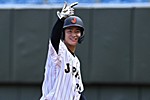 |
5th U-23 Baseball World Cup roster announcement 8/2/2024 |
|---|
U-18 articles
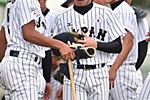
|
First ever! Samurai Japan High School meets Collegiate National Team at Koshien A Dream Matchup between Top Amateur Teams3/20/2015 |
|---|

|
XXVI BFA Asian 18U Baseball Championship Summary9/9/2014 |
|---|

|
Watch highlight of 18U Japan losing a close game against Korea in the finals (September 6th)9/6/2014 |
|---|

|
Watch highlight of 18U Japan winning a walk-off against Chinese Taipei (September 5th)9/5/2014 |
|---|
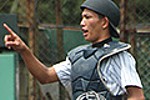
|
Samurai Japan Interview Vol. 13 Interview with 18U National Team Captain Ryoya Kurihara8/29/2014 |
|---|
Information articles

|
First ever! Samurai Japan High School meets Collegiate National Team at Koshien A Dream Matchup between Top Amateur Teams3/20/2015 |
|---|
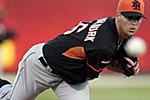
|
Regarding change of players for the "Hikari TV 4K GLOBAL BASEBALL MATCH 2015: Samurai Japan vs. All Euro"3/4/2015 |
|---|

|
Official Name and Ticket Sales for "Samurai Japan vs. Europe"2/5/2015 |
|---|
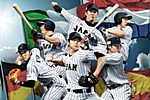
|
“GLOBAL BASEBALL MATCH 2015 SAMURAI JAPAN vs. ALL EURO” - Event Overview2/5/2015 |
|---|
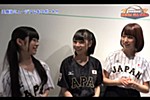
|
"Baseball Lovers! Assemble! Samurai Japan" Experience Baseball at the Sadaharu Oh Baseball Museum for this 3rd1/28/2015 |
|---|



